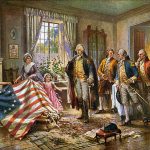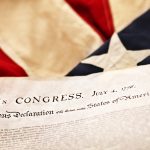The self-evident truths of the Declaration of Independence, whose 237th birthday we celebrate on Thursday, aren’t as widely thought to be “self-evident” as they once were. They have been forgotten by many and transformed beyond recognition by others.
Our president, for example, is fond of invoking the Declaration’s equality principle in support of redefining marriage. Speaking at a reception for LGBT Pride Month, he claimed that same-sex marriage could “be traced back to our Declaration of Independence—the fundamental principle that all of us are created equal.”
Yet some conservatives worry that Obama may actually be right. They wonder out loud whether all the talk of equality and liberty doesn’t set the stage for the egalitarianism and licentiousness of modern liberalism. They are wary of rights and wonder why the Declaration doesn’t talk more of duty, community, and family.
As the Fourth of July approaches, it might be good for us to revisit our great charter of liberty, to remind ourselves of its true meaning and to see why modern liberalism wasn’t baked into the Founding cake.
Start your day with Public Discourse
Sign up and get our daily essays sent straight to your inbox.We begin, not on the Fourth of July, but today, on the second of July. For it was on July 2, 1776, that the American colonies actually declared their independence from Great Britain. With twelve colonies voting yes and New York abstaining, the Continental Congress approved a short resolution declaring that “these United Colonies are, and, of right, ought to be, Free and Independent States.”
The next day, John Adams wrote a letter to his wife Abigail, in which he called the second day of July 1776, “the most memorable Epocha, in the History of America . . . It ought to be solemnized with Pomp and Parade, with Shews, Games, Sports, Guns, Bells, Bonfires, and Illuminations from one End of this Continent to the other from this Time forward forever more.”
Adams, of course, was off by two days. In America, we celebrate not the day on which we declared our independence, but the day on which we justified our independence to “a candid World.” What we call the Declaration of Independence—“The unanimous Declaration of the thirteen united States of America”—is, in fact, a justification of independence, an argument for independence. The actual declaration of independence only takes up one paragraph at the very end of the document.
In the course of making this argument and building their case, the founders also laid down the timeless and universal principles that were to define the new country. In that second paragraph, we find the clearest, most concise, and most eloquent articulation of the American creed. The truths proclaimed by the Declaration of Independence define us as a nation and bind us together as Americans. They unite the diverse pluribus into an American unum.
Natural human equality is the first axiom of the American creed. The founders, of course, recognized that human beings are different and unequal in more ways than anybody could count. But for political purposes, all men and women—regardless of race, religion, sex, or whatever the oppressed category du jour might be—are born equally free and independent and therefore may not be ruled without their consent. In America, we recognize neither natural slavery nor divine-right monarchy. The differences that separate us are never so great as to create a chasm between human beings. As Thomas Jefferson explained: “Because Sir Isaac Newton was superior to others in understanding he was not therefore lord of the person or property of others.”
Given the vagaries of life and the great diversity of talents and interests among human beings, we will inevitably end up in different stations in life. And so the greatest work of American political thought defined the “first object of Government” as “the protection of different and unequal faculties of acquiring property,” from which result “different degrees and kinds of property.”
As for the claim that equality mandates redefining marriage, it is risible. (Ryan Anderson, my Heritage Foundation colleague and the editor of Public Discourse, points out the various flaws in Obama’s claim at The Foundry here.)The “Laws of Nature and of Nature’s God” countenance ordered liberty, and the husband-and-wife, mother-and-father family is a core institution for securing what the Constitution calls “the blessings of liberty to ourselves and our posterity.” What’s more, no one’s core rights are violated if marriage is not redefined to suit their tastes.
The second axiom of the American creed is that human beings are “endowed by their Creator with certain unalienable rights.” Other Founding era documents say that we possess them by birth or by nature. Today, we could say that they are seared into our DNA. Whatever the formulation, the point is the same: no one needs to give us our core rights. We possess them simply by virtue of being human. Criminals may violate them, governments may fail to secure them, but we are all morally entitled to “life, liberty and the pursuit of happiness.”
The Declaration emphasizes rights and not duties because its purpose is to affirm the rights of man against the claims of those in power—not to teach us our duties toward our Maker or our fellow man. Its aim, in Abraham Lincoln’s memorable formulation, is to act as “a rebuke and a stumbling-block to the very harbingers of re-appearing tyranny and oppression.”
The Declaration isn’t meant to displace the Bible or Aristotle’s Nicomachean Ethics as the guide to the good life. It doesn’t speak of friendship, family, and music, for example, not because it denies their importance, but because they fall outside its properly defined political purpose.
It does, however, acknowledge and point to the highest things—the reasons why it’s so important to resist tyranny and oppression. Hence the references to both the pursuit of happiness and happiness, the invocation of our “Creator” and “the Laws of Nature and of Nature’s God,” and the appeal to the “Supreme Judge of the World.” Politics is about creating the conditions that allow us to pursue the comprehensive human good—it’s not about directly securing the comprehensive human good for each person.
The Declaration’s two axioms, though self-evidently true, are by no means obvious. In fact, no other country had ever recognized them before, none at the time did, and most today only pay lip service to them. What the founders meant by a self-evident truth is an axiomatic definition: embedded in the word “man” are the inviolable principles of equality and natural rights. Others, the Third Reich or the Ayatollahs in Iran for example, may deny this and use another definition of man, but in America, we hold these truths to be self-evident and strive to live up to their true meaning.
From this simple definition of man, the remainder of the political teaching of the Declaration of Independence logically follows. If all men are created equal—i.e., if there are not natural or divine titles to political rule—then governments can only derive “their just Powers from the Consent of the Governed.” If we already possess our rights simply by virtue of being human, then the task of the government is not to give us rights, but “to secure these Rights.” We are free as a sovereign people to decide to enact additional rights—entitlements like Medicare, for example—but there is no God-given right to have the state or anyone else pay for your health insurance.
Lastly, if a government so established consistently fails to do its job, “it is the Right of the People to alter or to abolish it, and to institute new Government, laying its foundation on such principles and organizing its powers in such form, as to them shall seem most likely to effect their Safety and Happiness.” The security of individual rights translates into the collective safety and happiness of the political community.
And that’s the whole political teaching of the Declaration in a nutshell: a political definition of man contained in two axioms, and three corollary propositions on government. It’s that simple. And it’s easy to see why Progressives who ushered in modern liberalism made these principles their number one target. The affirmation of natural, unalienable rights, and the requirement that government be grounded in consent poses an insuperable obstacle for those who place their faith in the omnipotent administrative state.
Having laid down these core principles, the rest of the Declaration is devoted to marshaling evidence—the twenty-seven facts ”submitted to a candid World”—to prove that “a Prince, whose character is thus marked by every act which may define a Tyrant, is unfit to be the ruler of a free people.” Only then, after this long chain of reasoning, do “we, therefore” declare our independence.
It ends with the humble appeal for “the protection of divine Providence” and the noble pledge to support this declaration with “our Lives, our Fortunes and our sacred Honor.” America is not a country for servile men. We believe that we have not only a right to be free, but also a duty to be free. Like the founders before us, we too must pledge to oppose “with manly firmness [any] invasions on the rights of the people.”














